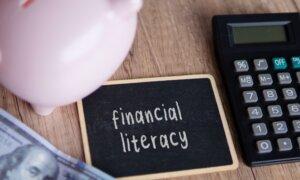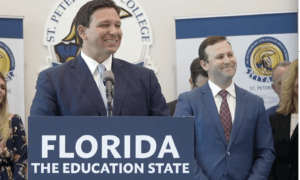By the 2030–2031 academic year, California public high school students will be required to take and pass a financial literacy class in order to graduate.
California is now the 26th U.S. State to add financial literacy instruction as a high school graduation requirement.
Assembly Bill 2927, signed into law by Gov. Gavin Newsom on June 29, funds single-semester personal finance courses for all public high schools at the start of the 2027–2028 academic year, with the graduation requirement taking effect for 2030–2031, according to a California Department of Education news release.
“Our young people need and deserve a clear understanding of personal finance so that they can make educated financial choices and build stable, successful futures for themselves and their future families,” Superintendent Tony Thurmond said in the June 27 news release.
“By adding personal finance to our high school graduation requirements, we acknowledge that managing household finances and building financial stability are essential life skills. Every child should have the opportunity to build these essential skills before navigating adult financial choices, not just those who happen to have the opportunity to learn these concepts at home or through an elective.”
Next Gen Personal Finance, a nonprofit organization that advocates for high school financial literacy mandates, verified that, with California’s law, more than half of the states now have this requirement. Florida previously implemented the measure. The other two largest states, New York and Texas, have not yet passed the requirement, though personal finance units are included within existing coursework.
According to Next Gen’s website, Pennsylvania, Wisconsin, Oregon, Louisiana, Connecticut, Minnesota, Indiana, and West Virginia have joined the growing list since 2023. The company publicizes its goal of nationwide requirements by 2030.
“Given the topic’s importance, comprehensiveness, and fast-changing nature, it must be its own course,” the website said of the organization’s “#Mission 2030” initiative. “Students deserve this. Personal finance cannot be covered adequately when it’s embedded in another course for a week or two or when another course entirely is used to satisfy a personal finance requirement.”
New York legislators have introduced similar legislation multiple times, most recently last year, but the bills never made it past the committee level. The latest version of the bill, referred to the state Senate Education Committee in January, proposed requiring the class on a “pass or fail basis” where final grades could not count toward students’ grade point averages even though successful completion would be a graduation requirement.
Dale Kramer of Kramer Walth Strategies in Massena, NY, coordinated and taught financial literacy courses for eight years as an elective in his local school district, located on the northern tip of the state next to the Canada border. He says the curriculum can begin with basic lessons about budgeting the smallest amounts of money and expand into lessons about investment portfolios and wealth management.
“It’s remarkable how much the kids can enjoy this and learn about personal accountability and responsibility,” Mr. Kramer said during a July 5 interview with The Epoch Times.
Mr. Kramer, who previously worked for Smith Barney wealth management business, also lobbied Albany to support personal finance curriculum in all public school districts.
With the absence of paper—currency and checks—young people today struggle to grasp that money is tangible, not just something “that’s in their phones.”
Moreover, Mr. Kramer added, more often than not, they see their parents pay for goods and services with credit cards or phone apps, so learning on this topic is not taking place outside of the classroom.
“Kids don’t have paper routes anymore, and money is out of sight, out of mind,” he said. “I couldn’t press any harder on this, especially with the post-literate digital culture that we’re living in.”
Mr. Kramer said the upperclassmen who took his high school personal finance course concluded their work by designing a $10 million mutual fund. Math knowledge was necessary, of course, but they also had to incorporate English Language Arts skills for writing summaries or communicating with would-be investors. Social studies also played a role as current events like the Great Recession or the Housing Crisis impacted the students’ decisions.
All told, 84 percent of the Massena students who took Mr. Kramer’s elective pursued business or finance as a college major, he said.
“But the most important thing for everyone was understanding the practicalities of what we learned about so they could manage their own money,” he said, adding that one lesson dealt with vehicle purchases and learning how to draw that line when the cost of maintaining a car or truck exceeds its value.
Mr. Kramer’s class was discontinued due to a lack of staff; he had help from two full-time teachers who have since retired. He hopes similar classes will someday be available at high schools across New York State, to include lessons about income taxes, predatory lending, and the dangers of acquiring too many “member rewards” cards.
“Delayed gratification is still relevant,” he said. “You don’t have to have everything today.”
Original News Source Link – Epoch Times
Running For Office? Conservative Campaign Consulting – Election Day Strategies!


